Sunday, February 07, 2021 / 11:37AM / By Tope Fasua / Header ImageCredit: 9to5Mac/CBN
"The traditional financial system is deeply rooted, organized, andbacked by government. Cryptos are not... At least not for now!"
First,a bit of history. A supposed Japanese named Satoshi Nakamotostarted the first bitcoin sometime in 2007. Indeed, nothing is known about whoever started the conceptapart from what they claim to be. No pictures. The name has been indicated as apseudonym (fake), and so also may be the nationality and the current age offorty-five (45). What is not in question though, is the bitcoin net worth ofSatoshi, who could be a man or a woman. $8.8 billion is the figure, at 2020prices. The fuzziness around founder-ship presents the first contradiction inthe crypto saga, for a system which seeks to achieve total transparency intransactions was birthed on anonymity.
NB: Satoshi Nakamoto is the name used by thepresumed pseudonymous person or persons who developed bitcoin, authored thebitcoin white paper, and created and deployed bitcoin's original referenceimplementation. As part of the implementation, Nakamoto also devised the first blockchaindatabase.
Theidea was to create a different currency system - and if you like, entirefinancial system - that short-circuits the current traditional one. This wasborne out of a need to rebel against current fiat currencies.
Now, inEconomics, we call today's currencies 'fiat currencies' because they arecreated by fiat and command the value on their faces, because governments saythey should. Fiat is force or command. Before the global adoption of fiatcurrencies, money was backed by other assets such as gold.
Theproponents of cryptocurrency believed that there is a need to push back and dosomething different, that will mimic the attributes of a gold-backed currencyin view of durability and scarcity but do better than the current system bybeing smart, secure and not possible for central banks to issue at will. There are also other known failures of the current financial andcurrency systems, notably bank failures and bailouts, lack of transparency,inefficiencies, and excess charges which make a number of the bank executivesand even regulators exceedingly rich. Nakamoto and co believe that there is aneed to stop the exploitation of the masses (that is an irony today though,given Nakamoto's net worth).
So,from get-go we have to understand that cryptocurrencies declared a war on thetraditional banking and financial system. And the uptake has been frighteningeven if the road is laden with booby traps which we may be able to discussshortly.
Afriend, Nnamdi Nwizu, informed me that one of the first known bitcointransactions was for the purchase of a pizza. 10,000 bitcoins was exchanged fora pizza. Today, 10,000 bitcoins are worth $300 million or anything like N14billion. See the meteoric jump. This kind of phenomenon has attracted a lot ofpeople to acquire and keep cryptocurrencies. But we have also seen muchvolatility in the prices of these cryptocurrencies, a number of which are saidto be scams. Imagine an asset whose price could fall overnight by 60%?Nigerians who are investing in it should be clear about something; they aremerely riding the waves. Nothing underpins these cryptocurrencies.
As afact, far more cryptocurrencies have failed than have succeeded. There areabout 4,000 cryptocurrencies around today with just a handful of them beingreal or successful. This article states that 1,000 cryptocurrencies havefailed, making away with billions of dollars from people who wanted to play themarket. The purpose is almost defeated because the focus in nowsimply on probable gains that people can make from getting in on theaction. In 2019, a Canadian cryptocurrency Quadriga went down with $250 millionof investor money when the founder, Gerald Cotten was said to have died whilehoneymooning in India. Those whom he duped are calling for his body to beexhumed.
So,just as the traditional banking and finance system is flawed, so also isthe proposed replacement - cryptocurrencies. I will shed a bit of light below.Given that no system is perfect, my concerns are:
1. The anonymityit provides is a haven for criminality.
2. What drivesprices and is there any opportunity for abuse?
3. If there is noregulator are a few people likely to take advantage?
4. What causesvolatility in prices?
5. What happenswhen a coiner dies? This is very important in this age of a thousand deaths.
6. How exactlyare coins mined and who has ability to mine?
7. Do we in theseparts have the electric power and computing capability and speed to mine? Doesthat not skew the market already?
Startingwith my last concern, I realized that the mining of these cryptos is thereal work. I then realized that it takes about 10 minutes to mine one coin, butyou require 72,000 Gigabytes of electricity to do this. I converted 72,000gigawatts to megawatts and found it was a mere 72 million megawatts. The wholeof Nigeria still tries to generate about 5,000 megawatts. So, obviously thereis a disadvantage here. Apart from those who somehow have the capacity to minethese coins, aren't other coiners just gambling or at best just disguising someof their wealth in the name of investing? On my concern with mining, Nnamdiopines that "You need super computers, set up all in a warehouse space or so toachieve the mining power, and it consumes a lot of electricity, which funnyenough counts towards the cost of transactions. This is what makes it too hardto copy and no, we are not even close locally to the kind of mining techrequired in Nigeria.
I alsofound out that when most coiners die, no one is able to access theirinvestments which ab initio are encrypted with passwords, passphrases andwhatnot. People don't usually plan to die.
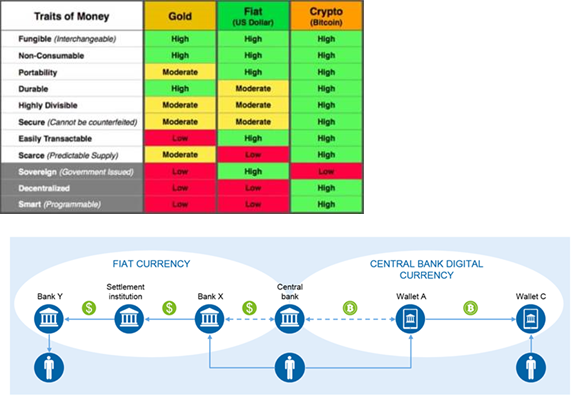
Source: Tope Fasua and BankingHub
Now,this is where regulation helps in the financial markets. Apart fromdeposit insurance which kicks in in the event of collapse of an insured andregulated financial institution, the relations of a dead account holder in atraditional bank could still have access to their balances. This is also wherewe have to let the usually young revolutionaries behind and in support ofcryptocurrencies that history matters, and the traditional banking system hadbenefited from centuries of experience, battles and dialogue.
Thesingle story that all the bankers are ripping the rest off may not be 100%correct. The traditional system and indeed the fiat currency system, does havetheir own merits. In the case of Gerald Cotten the founder of Quadriga cryptoin Canada, his newly wedded wife Jennifer Robertson (a Canadian real estatedeveloper) said everything about him was encrypted and so she had no knowledgeof what he did with people's monies. He was said to have died en route doingsome charity in India. An Indian doctor signed his death certificate but mostof his 76,000 victims don't believe he is dead.
On thequestion of volatility, my friend Nnamdi asks "with Bitcoin going from$3k to $30k in a year, how does one trade with something so volatile?" Ichecked the price graph for Bitcoin since 2009. The prices were stable at about$2,000 till around 2017. Since then, it has been quite a ride, hitting $14,000sometime in 2018 before receding to $4,000. Today, a bitcoin trades at over$40,000 which is an all-time-high. It seems unlikely that the current meteoricrise will be sustained.
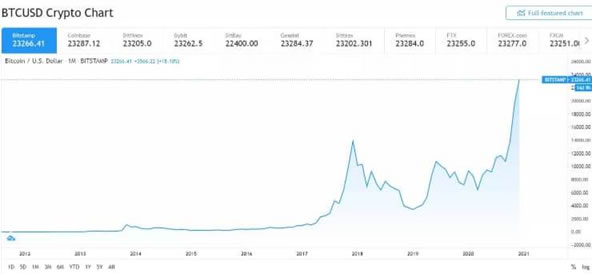
Source: Google
On thequestion of what exactly drives prices, one of the listed advantages ofcryptocurrencies is 'scarcity'. This is also one of the attributes of goodmoney i.e., money should not be just anything you could pick off the ground.Even cowries aren't that common except by the sea. The proponents of cryptocurrencysuggest that only a minimum or finite amount of the currency will be availableand also that there is nothing like a Central Bank sitting somewhere printingmoney on behalf of a government and determining who gets what. Now that isgreat. However, the advantage also presents a downside. Nnamdi calls ita 'melt up' (as against a meltdown). This is because the priceof cryptocurrencies seems to trend up because of the scarcity. The awareness isgrowing, pushing more people into trading or just buying the currency.
Havingbeen around for over a decade now, there is more confidence that perhaps thesecurrencies are here to stay. Also, in a place like Nigeria a lot of illegalmoney may moonlight as cryptocurrencies and that drives the demand. Butthe volatility remains. With no underlying fundamentals, traders trade thewind. What is more? This limitation shows that cryptocurrencies are limitedin use for monetary policy purposes and even fiscal systems could seize up ifindeed there comes a day when cryptos run the entire system.
Look atthe world today, being run by a new Keynesianism by which every country isborrowing and printing just to get out of this well, self-inflicted globaleconomic meltdown? Cryptocurrencies begin to resemble a contraption designed byidealists, some of whom say they want to create an ideal and digitized worldwhere everyone is tracked down to the nanosecond. Are they realistic? Or is theidea even healthy for humanity? We aren't robots, are we?
AFight to the Finish (?)
Cryptoin my view is not ready for the all-out war globally. Global acceptance by thetraditional economy is going to take a lot of time e.g., for farmers or marketwomen to accept crypto. If it started as a rebellion (which is the case), thenyou must think of the incentive for the global economy to sign on to thatrebellion with you against the devil they know. This then means that untilthere is global acceptance it will continue to be easy to create panic in thecrypto world and big players can dump the currency when they have achievedgains. It then becomes worse than the stock market because forcryptocurrencies the fundamentals are non-existent apart from an analysis ofhow many are adopting the currency and who is winning between an establishedtraditional banking system and the new kids on the block. At least for stockmarkets people can see some companies actually producing a tangible good orservice.
Thelast issue I can address today has to do with the propensity for fraud.In all the analysis I have seen from crypto traders, trainers and enthusiastsin the last two days, they have always mentioned that many fraudsters are inthe system. One of them mentioned that Telegram is crawling with fraudsters whohave made away with people's money even before the CBNcircular. With the banks being re-instructed to hands off being platformsfor cryptocurrency exchanges, coiners and potential coiners will have to lookfor ways to trade among themselves. Some have suggested that they bring in abit of trust (but remember that the fundamental reason for cryptocurrency is toeliminate the element of trust entirely).
Somehave suggested that cryptos may still be traded but narrations should not carryany word that suggest it is for cryptocurrencies. This makes the payer veryvulnerable to fraud. One chap suggested that this is an opportunity to gomainstream and consummate every transaction in crypto. He mentioned school feesbut I imagine that many schools may not want to accept crypto coins. Othersavvy businesses may, but I am unsure, if we have enough of those here, to beable to expand the crypto ecosystem. All I can see are speculators and a fewshady monies in the horizon.
Thebankers know that they are done if cryptocurrencies really take off andreplaces traditional currencies. Quite a number of them have invested incryptos just to hedge their bet. But the traditional financial system is deeplyrooted, organized, and backed by government. Cryptos are not.
Tilldate, only 5 countries have issued their own cryptocurrencies namely China,Ecuador, Senegal, Tunisia and Singapore. The traditional system has a vice gripyet on the rest. The question of exchangability begins to pop up e.g.,how many Bitcoins for one China bitcoin? And what are the histories of eachbitcoin to be able to adjudge the future. There will be many errors andsurprises for good or ill. Or will it be that all cryptos shall merge into asingle global currency someday? Maybe, like some have suggested and as isalready happening, the big players like big banks will hijack the wholeconcept, and ram it all back into traditional banking or offer it as option. Ihave also seen that some guaranteed cryptos exist, tied to assets or existingcurrencies. Does that not defeat the purpose? The answer my friend, is blowingin the wind. Oops! Wind again!
About the Author
Tope Kolade Fasua is a Nigerian businessman, economist and writer. He isthe founder and CEO of Global Analytics Consulting Limited, an internationalconsulting firm with its headquarters in Abuja, Nigeria. He was the 2019presidential candidate of the Abundant Nigeria Renewal Party (ANRP), which hefounded. He can be contacted via e-mail at [email protected]
Recent Articles by TheAuthor
1. Why NigeriaNeeds to Drive Productivity and Fiscal Restructuring - Tope Fasua - Sep 03, 2020
2. Africa andThe Entrepreneurship Hype - Tope Fasua - Jan 15, 2020
3. DSTV,Netflix and the Value of Time; The Real Competition for Our Mindshare - TopeFasua - Dec 02, 2019
4. ThoughtsOn Nigeria's Rice Bubble - Fasua - Oct 25, 2019
5. As forSouth Africa, So for Jigawa: Understanding The Missing Point - Fasua -Sept 20, 2019
6. WhyNigerians Will Never Leave South Africa - Fasua - Sept 18, 2019
7. IRan to Learn - Tope Fasua - Mar 01, 2019
8. Fears for The Nigerian Economy In TheYears Ahead - Fasua
9. ForgetIt; Nigeria is Not Ready for Agriculture
10. Nigeria'sInfrastructure Racket - Frauds, Corruption and Shallowness
11. ToRescue Nigeria: We Must Go into a War Mode
12. ShakingTables - Poverty Coding and Feminism on Steroids
13. Howto Un-Break The Nigerian Society and Economy
14. TheIllogical World of Nigeria's Oil and Gas Industry
15. APetition for Action - Increase The 2019 Budget to a Minimum of N15 Trillion-Tope Fasua
16. TheGreatest Conspiracy Against Nigeria Youths
17. AFederal Republic of Inequality and Oppression
18. ANRPPresidential Candidate Tope Fasua Speaks on The State of The Nation
Related Links and Post on the CBN Action
1. Central Bank of Nigeria |Featured Articles: Again, CBN warns on Virtual Currencies - CBN, Feb 28, 2018
2. Central Bankingand the Cryptocurrency Challenge - Call it like it is - by Tope Fasua,Feb 07, 2021
3. CBN Tightens Noose onCryptocurrency Market - Proshare, Feb 05, 2021
4. How FBI Warned FG, CBN on Scammers Using Cryptocurrenciesto Defraud the West - Thisday, Feb 07, 2021
5. Regulation of Cryptocurrency Around the World -Library of Congress
6. A Thread Explaining What the CBN Circular Means and Whythe CBN issued It - Stears Business, Feb 05, 2021
7. CBN Circular on CRYPTOCURRENCY: CBN and SEC SingingDiscordant Tunes - By Stephen Azubuike, StephenLegal, Feb 05, 2021
8. The Unsettling Dust over Cryptocurrency Transactions - by James Emejo, ThisDay, Feb 07, 2021
10. Feb 05, 2021
11. More than 1,000 cryptocurrencies have already failed -here's what will affect successes in future - by Gavin Brown and Richard Whittle, TheConversation, Nov 21, 2019
12. Banning Cryptocurrency will Give Power to Outlaws - EmekaOkoye, Leadership, 3 years ago
13. VIDEO: 2017 CIBN forum discussingblockchain technology in Nigeria - WebTV,2017
14. Banking and Bitcoin - Can Crypto Kill the Banks? - by Ivan onTech, Sep 19, 2020
15. Can Bitcoin Kill Central Banks? - by JamesMCWHINNEY, Investopedia, Jun 25, 2019
16. Central Bank Digital Currency and its impact on thebanking system: A need for a new payment system - by Zeb,Innovation & Digital, BankingHub, Aug 22, 2018
17. Why Central Bank Digital Currencies will Destroy Bitcoin - by NourielRoubini, The Guardian, Nov 19, 2018
18.
RelatedVideo
The first video is an excerpt fromthe 2017 CIBN forum discussing blockchaintechnology in Nigeria. Mr. Musa Jimoh (thethen Deputy Director, Payments CBN) was giving the position of the bankingregulator on digital currency. CBN's position has since evolved as changesoccurred in adoption, infrastructure, risks & global regulation.
Related News - Digital Assets
- Legally Speaking, is Digital Money Really Money? - Jan 14, 2021
- Ghana Launches World's First Digital Finance Policy Amid COVID-19 - Jan 08, 2021
- Banks and Thrifts May Participate in INVN and Use Stablecoins for Payment Activities - Jan 05, 2021
- IOSCO Publishes Report on Education of Retail Investors Regarding Risks of Crypto-Assets - Dec 24, 2020
- How Central Banks Can Catalyze Financial Inclusion Through Digital Currency - Oct 16, 2020
- Regulation of Cryptocurrency and Digital Assets in Nigeria: New Beginnings - Oct 15, 2020
- Stakeholders Call for Clarity in Regulation and Standardization of Nigeria's Digital Asset Market - Sep 28, 2020
- Digital Assets Classification Aimed at Investor Protection - SEC - Sep 21, 2020
- SEC Nigeria Issues Statement on Digital Assets, Their Classification and Treatment - Sep 14, 2020
- China Starts Major Trial of State-Run Digital Currency - Apr 30, 2020
- Analysts Discuss Blockchain Technology and Regulation of Digital Assets in Nigeria - Nov 18, 2019
- Winds of Change: The Case for New Digital Currency - Nov 15, 2018
- Barclays Files Two Digital Currency and Blockchain Patents with U.S. Patent Office - Jul 21, 2018
- Saudi Arabia Capital Market Authority Warns Investors Against Digital Currency Investment - Feb 13, 2018
- Distributed Ledger Tech Solutions For Settlement Of Payments Using Central Bank Digital Currency - Oct 13, 2017
- China Is Developing its Own Digital Currency - Mar 04, 2017
- Sweden's Central Bank Considers Issuing A Digital Currency - Nov 16, 2016
Related News - BlockChain & Cryptos
1. Indian ExchangesLaunch Campaign Seeking to Avert Potential Crypto Ban - Coindesk- Feb 05, 2021
2. AnchorageGranted US's First National Crypto Bank Charter
3. Can BitcoinBecome the Next Global Reserve Currency?
4. Banks andThrifts May Participate in INVN and Use Stablecoins for Payment Activities
5. How CentralBanks Can Catalyze Financial Inclusion Through Digital Currency
6. Regulation ofCryptocurrency and Digital Assets In Nigeria: New Beginnings
7. RegulatingCryptocurrency and Initial Coin Offerings: The Nigerian Perspective - Pt 2
8. RegulatingCryptocurrency and Initial Coin Offerings: The Nigerian Perspective - Pt 1
9. BLOCKDeFiVirtual Conference and Exhibition 2020
10. China StartsMajor Trial of State-Run Digital Currency
11. IOSCO ReportExamines How Existing Regulatory Principles Could Apply to Stablecoins
12. BIS: CentralBank Group To Assess Potential Cases For Central Bank Digital Currencies
13. DemystifyingCryptocurrency - A Meristem Report
14. Facebook's LibraMust Meet Strict Standards - Bank of England
15. From Stablecoinsto Central Bank Digital Currencies
16. DigitalCurrencies: The Rise of Stablecoins
17. Money AndPrivate Currencies: Reflections On Libra
18. UN Details HowN.Korea Carried Out Crypto and SWIFT Hacks To Amass $2bn To Fund Its NuclearPrograms
19. Do YoungNigerians Prefer Cryptocurrency for Payment?
20. BlockchainOffers Efficiency but Untested in Securitization
21. UK FinancialConduct Authority Proposes Ban On Sale Of Crypto-Derivatives To RetailConsumers
Related News - Monetary Policy
- Is the Economy Spiraling? - LBS Executive Breakfast Session - February 2021
- Total Value of Capital Importation into Nigeria was US$1,069.68m in Q4?óÔé¼Ôäó20 - NBS
- Rebasing Nigeria's GDP: New National Accounts, More Services
- Diaspora Remittances in Nigeria: Examining the New CBN Policy (2)
- Diaspora Remittances in Nigeria: Examining the New CBN Policy (1)
- Inflationary Pressure Still Straining Pockets
- CBN Deals the House Card as Policy Rates Remain Unchanged
- CBN Communique No. 134 of the MPC Meeting - Jan 25-26, 2021
- MPC Holds All Policy Parameters at the End of Its First Meeting in 2021
- Monetary and Interest Rate Policy in 2021: Going for Growth
- CBN to Sustain Expansionary Monetary Policy Till Q1, 2021 - Cordros Securities
- Ten MPC Members, One Shared Outlook
- Personal Statements by MPC Members at the 133 MPC Meeting of Nov 23-24, 2020
- CBN Rolls the Dice to Tackle Market Liquidity and Dollar Dearth
- Implications of CBN's Introduction of Its Special Bills to the Market
- CBN Introduces Special Bills to Deepen the Financial Markets, An Additional Liquidity Mgmt Tool
Related News - New Rules & Regulations in Nigeria Capital Market
- Crowdfunding Rules and Regulations in Nigeria Released by SEC
- Collective Investment Schemes General Rules & Regulations in Nigeria Released by SEC
- Nominee Companies Rules and Regulations in Nigeria Released by SEC
- Fund Management Products Rules and Regulations in Nigeria Released by SEC
- Payment of Administrative Charges Rules and Regulations in Nigeria Released by SEC
- Annual Supervision Fees for CIS Rules & Regulations in Nigeria Released by SEC
- Sundry Amendment to Valuation Report Rules and Regulations in Nigeria Released by SEC
- Sundry Amendment to Amount to be Underwritten Rules and Regulations in Nigeria Released by SEC
- Investment by CIS in Unlisted Securities Rules and Regulations in Nigeria Released by SEC
- Sundry Amendment to Contents of a Trust Deed Rules and Regulations in Nigeria Released by SEC
- Steps on Unclaimed Dividend Retrieval Process as Highlighted by SEC Nigeria
- SEC Requests CMOs to Disclose Security Dealings of 500,000 Units within 24hrs of Activity
- Revision of Stamp Duty on NSE Transactions to 0.08% from 0.075% Effective 7th December 2020
- SEC Proposes Amendment to Its Rule on Renewal of Registration by CMOs
- SEC Issues Pre-Notice on Withdrawal of Certificates of Registration of 157 Inactive CMOs
- SEC to Discontinue the Practice of Issuing Prior Approval for Audited Accounts of CIS
- IOSCO Publishes Report on Education of Retail Investors Regarding Risks of Crypto-Assets
 Lagos, NG • GMT +1
Lagos, NG • GMT +1










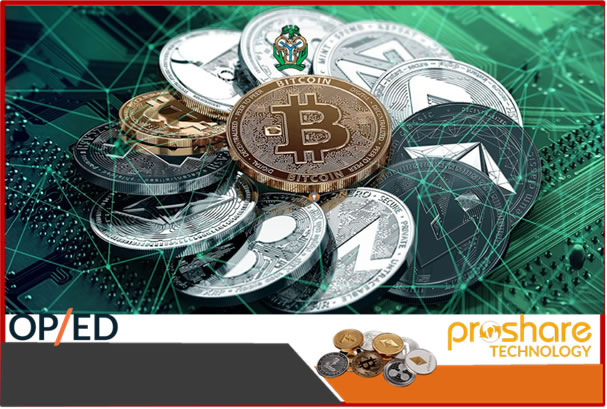
 4326 views
4326 views






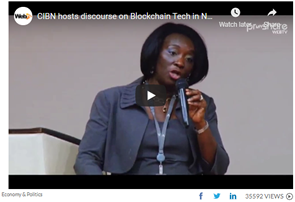
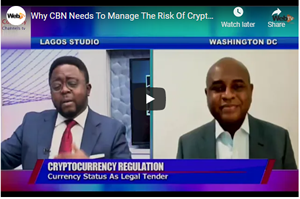












 Sponsored Ad
Sponsored Ad
 Advertise with Us
Advertise with Us









